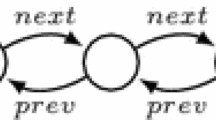Abstract
The pebble game on directed acyclic graphs is commonly encountered as an abstract model for register allocation problems. The traditional move rule of the game asserts that one may "put a pebble on node x once all its immediate predecessors have a pebble", leaving it open whether the pebble to be placed on x should be taken from some predecessor of x or from the free pool (the strict interpretation). We show that allowing pebbles to slide along an edge as a legal move enables one to save precisely one pebble over the strict interpretation. However, in the worst case the saving may be obtained only at the cost of squaring the time needed to pebble the dag. It shows that one has to be very careful in describing properties of pebblings; the interpretation of the rules can seriously affect the results. As a main result we prove a linear to exponential time trade-off for any fixed interpretation of the rules when a single pebble is saved. There exist families of dags with indegrees ≤2, with the property that they can be pebbled in linear time when one more pebble than the minimum needed is available but which require exponential time when the extra pebble is dropped.
Preview
Unable to display preview. Download preview PDF.
Similar content being viewed by others
5 References
Aho, A.V. and J.D. Ullman, Principles of Compiler Design, Addison-Wesley Publ. Comp., Reading, Mass., 1977.
Cook, S.A., An Observation on Time-Storage Trade Off, Journal Computer Systems Sciences 9 (1974) 308–316.
Gilbert, J.R. and R.E. Tarjan, Variations of a pebble game on graphs. Rep. Stanford STAN-CS-78-661 (Sept. 1978).
Hopcroft, J., W. Paul and L. Valiant, On Time versus Space, J.ACM 24 (1977) 332–337.
Lingas, A., A PSPACE-complete Problem related to a Pebble Game, in: G. Aussiello and C. Böhm (eds.), Automata, Languages and Programming (Fifth Colloquium, Udine, 1978), Springer Lecture Notes in Computer Science 62, 1978, pp. 300–321.
Paterson, M.S. and C.E. Hewitt, Comparative Schematology, Record of Project MAC Conference on Concurrent Systems and Parallel Computations (June 1970) 119–128, ACM, New Jersey, Dec. 1970.
Paul, W. and R.E. Tarjan, Time-Space Trade-offs in a Pebble Game, in: A. Salomaa and M. Steinby (eds.), Automata, Languages and Programming (Fourth Colloquium, Turku, 1977), Springer Lecture Notes in Computer Science 52, 1977, pp. 365–369.
Paul, W., R.E. Tarjan and J.R. Celoni, Space Bounds for a Game on Graphs, Math. Syst. Th. 10 (1976) 239–251.
Pippenger, N, A Time-Space Trade-off, Computer Science Res. Rep. RC 6550 (#28265) IBM, Yorktown Heights, 1977 (also" J.ACM 25 (1978) 509–515).
Reischuk, R., Improved bounds on the Problem of Time-Space Trade-off in the Pebble Game (Preliminary version), Conf. Record 19th Annual IEEE Symp. on Foundations of Computer Science, Ann Arbor, 1978, pp. 84–91.
Savage, J.E. and S. Swamy, Space-Time Trade-offs in the FFT Algorithm, Techn. Rep. CS-31 (August 1977), Div. of Engineering, Brown University, Providence, 1977.
Sethi, R., Complete Register Allocation Problems, SIAM J. Comput. 4 (1975) 226–248.
van Emde Boas, P. and J. van Leeuwen, Move-rules and trade-offs in the pebble game, Techn. Rep. RUU-CS-78-4, Dept. of Computer Science, University of Utrecht, Utrecht, April/August 1978.
Walker, S.A., Some Graph Games related to Efficient Calculation of Expressions, Res. Rep. RC-3633, IBM, 1971.
Walker, S.A. and H.R. Strong, Characterizations of Flow-chartable Recursions, Journ. Computer System Sciences 7 (1973) 404–447.
Editor information
Rights and permissions
Copyright information
© 1979 Springer-Verlag Berlin Heidelberg
About this paper
Cite this paper
van Emde Boas, P., van Leeuwen, J. (1979). Move rules and trade-offs in the pebble game. In: Weihrauch, K. (eds) Theoretical Computer Science 4th GI Conference. Lecture Notes in Computer Science, vol 67. Springer, Berlin, Heidelberg. https://doi.org/10.1007/3-540-09118-1_12
Download citation
DOI: https://doi.org/10.1007/3-540-09118-1_12
Published:
Publisher Name: Springer, Berlin, Heidelberg
Print ISBN: 978-3-540-09118-9
Online ISBN: 978-3-540-35517-5
eBook Packages: Springer Book Archive




